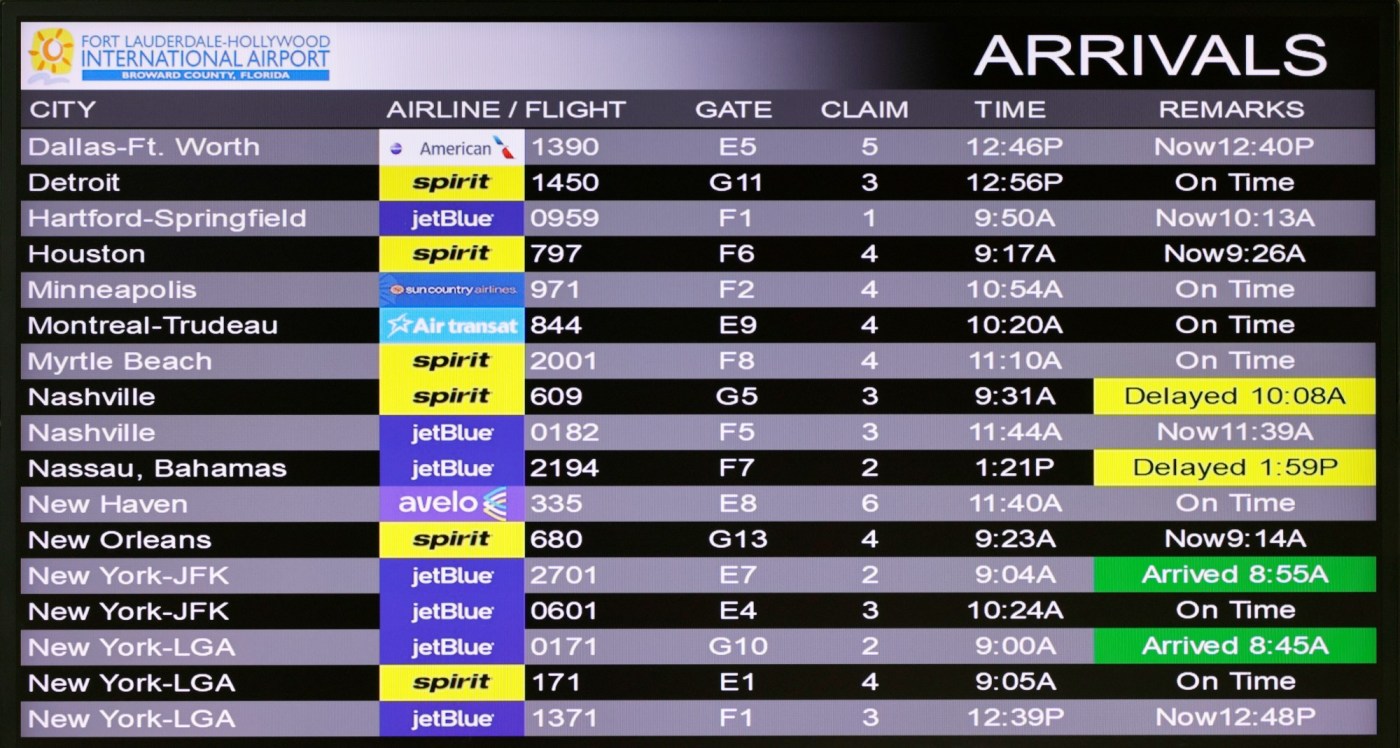
Airfares on average are among their lowest in years, but as airline losses mount, how long can the discounts last?
For air travelers, fare wars are a good thing. But as discounting continues to sweep the industry, airlines are getting a little edgy as many are reporting losses for the third quarter of this year.
For September, fares declined nationally by 13% when compared with September 2022, according to data from the U.S. Bureau of Labor Statistics. They were down 6.5% from September 2019, which was months before the COVID-19 pandemic broke out.
While consumers whipsawed by sharply higher prices are happy to be cut a break, airline managements have started to adjust their strategies for the coming year amid slippages in demand and persistently high fuel costs.
Financially, the year is becoming a turbulent one for the airlines, according to data from the U.S. Department of Transportation, which reported an industrywide net loss among 26 scheduled airlines of $1.2 billion in the first quarter and a net profit of $5.5 billion in the second quarter. But as the third quarter reporting period unfolds, the results have been mostly losses or lower profits for carriers checking in thus far, highlighted by Delta reporting a large profit while American posted a sizable loss.
South Florida-based ultra low cost carrier Spirit Airlines, which posted a $157.6 million net loss, said it would scale back its growth plans. JetBlue Airways of New York, which wants to take over Spirit, lost $153 million and forecast another deficit for the fourth quarter.
Southwest Airlines, which posted a profit that was 30% below last year’s third quarter, announced changes in its route system starting in June 2024. The plan includes the shift to Orlando of most of its nonstop international flights from Fort Lauderdale-Hollywood International Airport.
While no one is forecasting a financial washout for any of the airlines, the industry landscape is undergoing changes as the larger carriers start making things uncomfortable for the low-cost budget carriers, analysts say.
Budget carriers under pressure
“None of the budget airlines at least for now are at the risk of bankruptcy,” said Henry Harteveldt, of Atmosphere Research Group, a San Francisco-based advisory firm. “They all have cash balances and assets they can leverage to raise additional cash if necessary.”
“However, it’s very clear that larger airlines are starting to leverage their basic economy fare products more than they have in the past to compete for the customer base,” he said. “And that is going to make life more difficult for the budget airlines.”
“Southwest has been very aggressive so far this fall in offering a number of fare sales sometimes with flights starting as low as $29,” Harteveldt said.
Passengers stand at the Allegiant Airlines ticketing area at Fort Lauderdale-Hollywood International Airport on Thursday. (Amy Beth Bennett / South Florida Sun Sentinel)
Moreover, infrequent travelers who are “brand agnostic” are checking out amenities offered by the bigger airlines as alternatives to fee-based onboard services offered by the discount carriers.
“The airline industry is brutal when it comes to price-based competition,” Harteveldt said. “Our research shows 15% of passengers have loyalty.to some airline or alliance while 85% are making their airline purchasing decisions trip-to-trip. A lot of them divide their loyalties among multiple airlines.”
A takeover hangs in the balance
Looming in the background is the Biden Administration’s antitrust lawsuit that seeks to stop JetBlue’s $3.8 billion takeover of Spirit. The U.S. Justice Department, in concert with several Northeast states and the District of Columbia, argue the takeover would raise prices for consumers because Spirit would disappear after a deal is closed.
The case went to trial in a Boston federal court last Tuesday.
A win for the government would likely dash JetBlue’s expansion plans, which the carrier argues are critical for it to grow and offset a so-called “Big Four” domination of the industry by American, Delta, Southwest and United. A defeat would also likely squelch JetBlue’s ambitions to expand across Florida.
A JetBlue airliner flies past a Spirit Airlines jet at Fort Lauderdale Hollywood International Airport. JetBlue’s proposed buyout of Spirit is now on trial in a Boston federal court. (Joe Cavaretta/South Florida Sun Sentinel file)
South Florida’s three international airports are among the most well-served in the country by lower-cost airlines ranging from Spirit and JetBlue to Allegiant and Sun Country. At Fort Lauderdale-Hollywood International relative newcomers Avelo and Flair have entered the picture, providing consumers with travel choices to cities that were unavailable before those carriers took flight.
For its part, Allegiant Air, which is the centerpiece of a travel company based in Las Vegas, Nev., is hoping for a JetBlue court victory in Boston.
In a September deal designed to help mitigate government concerns that JetBlue’s takeover of Spirit would boost consumer prices, JetBlue agreed to transfer to Allegiant all Spirit holdings at Boston Logan International Airport and Newark Liberty International Airport. JetBlue would also turn over up to five gates and related ground facilities at Fort Lauderdale-Hollywood International “to promote ultra-low-cost carrier growth,” the airlines said.
The deal followed another by JetBlue that would shift Spirit’s holdings at New York’s LaGuardia Airport to Denver-based Frontier.
Approvals of both deals are required from local airport authorities, the FAA and DOT, and would occur after the closing of JetBlue’s buyout of Spirit in the first half of 2024.
Passengers line up for service at the Avelo and Flair Airlines ticket counters at Fort Lauderdale-Hollywood International Airport on Thursday. The airlines are two of the lower-cost airlines operating out of South Florida. (Amy Beth Bennett / South Florida Sun Sentinel)
In theory, the agreements would redistribute discounted flight services to consumers flying out of Fort Lauderdale to two other airlines — Frontier and Allegiant.
Allegiant, which along with Frontier also posted losses in the third quarter, is sticking with its strategy of providing unbundled fares off a low base price.
“Affordable fares are the foundation of Allegiant’s business model and consumers can continue to expect industry-low fares across our network,” the company said in a statement to the South Florida Sun Sentinel.
In the interim, will fares industrywide continue their downward trend?
“There is still a lot of uncertainty,” Harteveldt said. “What happens if there is a government shutdown? What happens if we have more strikes or if strikes are resolved? American and United are negotiating with the unions representing flight attendants.”
A likely outcome: Higher labor costs, and, perhaps, higher fares.
A passenger uses a self-service kiosk as a writing surface at Fort Lauderdale-Hollywood International Airport on Thursday. (Amy Beth Bennett / South Florida Sun Sentinel)


